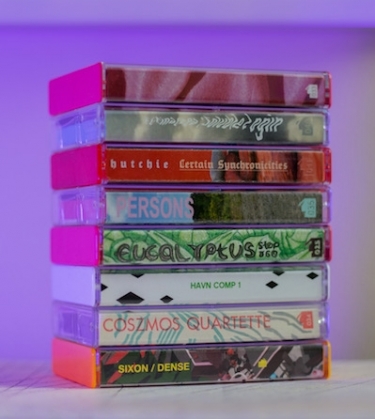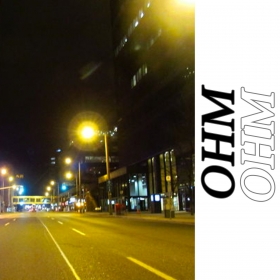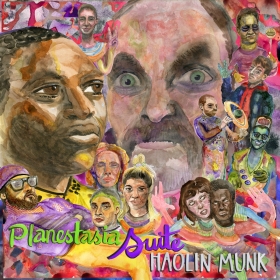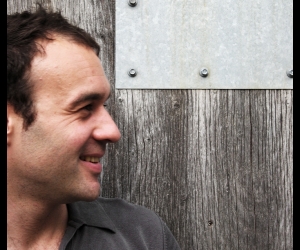First came the band, then the space, then the label.
The band is Haolin Munk, a jazz and hip-hop quartet formed in the early 2010s by drummer Aaron Hutchinson, tenor saxophonist Connor Bennett, alto saxophonist Chris Ferguson, and bassist Josh Wiener. The space is HAVN—Hamilton Audio Visual Node—a gallery and performance space just off James Street North in Hamilton, Ontario, which a collective of artists including the Haolin Munk folks opened in 2013. The label, also called HAVN, emerged from the confluence of the two.
In the early 2010s (and still today, to this jaded Toronto expat’s eyes) Hamilton looked like a DIY paradise—or at least a place where DIY’s conditions of possibility hadn’t been gentrified to death. Hutchinson and Bennett cite a litany of artists, labels, venues, and concert series that inspired them when they were starting out. There was Dorian Batycka’s art space in the Sonic Unyon (label) building, labels such as Perdu, Barton Street Tapes, and Scott Johnson’s Cloud Valley. There was the laptop orchestra at McMaster University, the New Harbours concert series, booker Ken Inouye, and so on. Even now, Hutchinson and Bennett are rhapsodic about the festivals and concert series presenters Strangewaves and ZULA, which bring an eclectic range of renowned experimentalists to the city year round.
HAVN was hatched at a time when a group of friends could rent the vacant storefront under one of their apartments and use it as a base to put on shows and release tapes of weird music. Putting on “four-ish shows a month for two years for no money” did lead to burnout, Hutchison admits, which is one of the reasons the venue doesn’t present as many live-music shows as it did in the early years. Also, both musicians have other creative pursuits keeping them busy. Hutchinson has a recording studio, and Bennett makes custom saxophone mouthpieces (Mats Gustafsson is a potential client, he says). But HAVN’s concert programming was important, Bennett says, “because out of that came the label and our DIY connections and touring connections.”
The first two releases on HAVN—and four of the first five—were tapes by Eschaton, Hutchinson and Bennett’s free-improv project, which features a fluid cast of collaborators from a wide range of styles. That experimental spirit runs through the label’s history, but it’s only one strand of what it does. The label’s sixth release, for instance, a cassette entitled OHM, is straight-up house music. A little further along in the catalogue is a disorienting beat-based sound collage by an enigmatic artist operating as Eccinaccea. Scott Brunelle’s Easy, Then It’s Over, the most recent release (as of this writing), is a confessional singer-songwriter offering. One of Hutchinson’s favourites is Cope Street by Livestalk and the Bodies, a twenty-four-track labour of love, two years in the making, by singer, songwriter, and multi-instrumentalist Kevin Fraser and a host of collaborators, which is absolutely sui generis (I hear Guided-By-Voices surrealism, Nick-Drake confessionalism, modern-rock bombast, and bedroom-pop DIY polish). Another Hutchinson favourite is the lovely, pastoral folk of the Coszmos Quartette.
Indeed, Hutchinson and Bennett can hardly restrain themselves when asked for catalogue highlights. Within the jazz and improv idiom, HAVN has released limited-edition tapes by stalwarts like multi-instrumentalist Colin Fisher (on just-intonated pedal steel and saxophone), the Brodie West-led quartet Eucalyptus, and Leland Wheely of BadBadNotGood, as well as a couple of releases from Toronto trumpeter Emily Denison and Montreal-based bassist Aaron Lumley, in addition to many Haolin Munk and Eschaton records. Then there’s the Hamilton Noise Orchestra, which extended Eschaton’s free-improv notion to the level of the orchestra. “The group took it quite seriously,” enthuses Hutchinson. “It’s all kinds of freaks from free jazz people to noise people to Earth, Wind and Choir people,” he says, referring to a local experimental choir.
Eclectic, to say the least.
Though Hutchinson and Bennett’s personal predilections run towards the experimental fringes of noise and improvisation, the label’s ethos is clearly much broader. For them, it’s about supporting artists, especially at the very beginnings of their careers, and giving them something physical and professionally designed and manufactured—usually a tape, but sometimes a CD or, rarely, vinyl—to show off. To this day, it remains a DIY exercise. “Our model is we lose money on every release,” says Hutchinson. Adds Bennett: “In a way it’s a patronage label. We’re putting money forward to get this art out and the artist gets to have a certain number of copies and we have a certain number of copies to try to cover costs.”
Though they’ve gotten grants for certain ambitious releases, notably Haolin Munk’s recent LP Planestasia Suite and an upcoming Eucalyptus vinyl, they have no plans to institutionalize further. “I’ve shopped that around, but it takes attention and effort, and the label’s pretty casual,” Hutchinson admits. “If somebody has an idea bubbling up, we pitch it to the group and if everyone’s in we go ahead and pitch our eighty bucks into that release. For those kinds of grants, you need accounting, more interest in marketing, and a business plan. We’re not interested in a business plan!”





